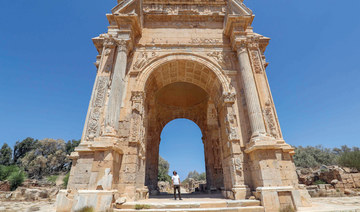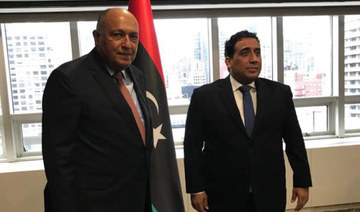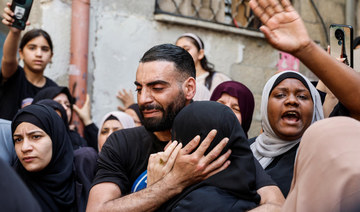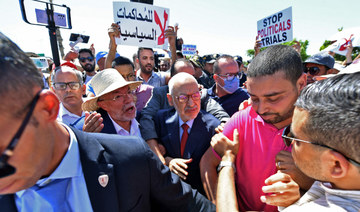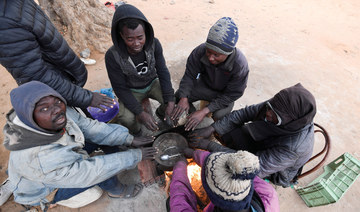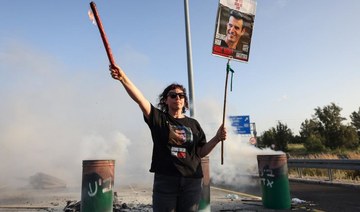NEW YORK: Libya’s efforts to heal after 10 years of war will require not only a national reconciliation, but also an international reconciliation between the Libyan people and the global community.
That is the view of Taher Elsonni, Libya’s permanent representative to the UN, who on Monday reiterated his country’s demand for an end to external interference and the withdrawal of all foreign forces and mercenaries.
“Enough is enough,” he said during an exclusive interview with Arab News. “Libyans are tired of 10 years of chaos.
“As much as we talk about national reconciliation, there should also be international reconciliation. As much as we talk about confidence building, there should be confidence building between the international community and Libyans — and that starts with the simultaneous withdrawal of all foreign fighters and mercenaries, and support for the will of Libyans when they go through the electoral process.”
Libyans have been killed and their country ravaged by thousands of foreign fighters recruited by the rival forces in the country. As long as Libya’s “free will” is held hostage by these armed groups and their foreign sponsors, Elsonni said, conflicts will continue to rage in the country at a time when the proliferation of such proxy wars is causing instability across the region.
The rebels who killed Chadian President Idriss Deby in April, for example, were based in Libya, where they amassed money, accessed advanced weaponry and gained battlefield experience as guns-for-hire.
“The challenge with mercenaries is that no one acknowledges their presence,” said Elsonni.
The UN-brokered Libyan ceasefire agreement in October 2020 included a call for all 20,000 mercenaries and foreign fighters to withdraw from the country within three months. But when the UN Security Council discussed ways of repatriating them, observers noted that some council members were fueling the problem.
For example, Russia’s support for the Libyan National Army includes mercenaries from Russian private security company Wagner Group. Turkey, meanwhile, provided transport for thousands of Syrians to fight in Tripoli, paid them salaries and offered promises of Turkish citizenship. Other mercenaries operating in Libya hail from South Africa, the US, the UK, Australia and about 30 additional countries.
Meanwhile, Libyans attempt to navigate this sinister foreign presence as they walk an already tricky path toward national reconciliation, and attempt to consolidate the many small victories achieved in the past year as part of the political process.
These achievements — which paved the way for a ceasefire and the formation of an interim unity government tasked with shepherding the nation toward parliamentary and presidential elections scheduled for December — would not have been possible without both Libyans and foreign powers reaching the conclusion that no one could win the war through military might, according to Elsonni.
“Everything was tried, and in the end everyone was convinced that there can be no military solution,” he said.
He conceded that all countries in the region are entitled to be concerned about preserving their security and national interests, but added: “You don’t need to intervene and interfere the way you did in order to have a stabilized region (and) boost the economy.
“Libya is a hub between Africa and Europe, East and West. Libyans are known for their modesty. I can no longer say Libya is a rich country, but it does have the means and the resources to come back, and with Libya stabilized we can find win-win deals that will satisfy everyone’s national interests as much as possible.
“So, let’s work together, put the past behind us and start a new phase. And let’s not provide an excuse for terrorism and extremism, which feeds on this chaos and perpetuates the conflict.”
The road to the national elections planned for December has been paved with as much fear as hope among Libyans.
Although the new Presidency Council managed to unify civilian executive bodies, the military remains fractured. Some fear that winners with weapons might start another war.
In the absence of a clear constitutional framework setting out the responsibilities of a new president, “who can guarantee that Libyans will not find themselves in the grip of yet another dictator?” asked Elsonni.
“There is a group of people that don’t want to lose the power they have today, so they are maneuvering and finding excuses for the elections not to happen,” he added.
“There are also those who fear losing power by having a high-level executive office, in the form of a president, that might lead to them losing popularity. Some want only parliamentary elections, and think a safer option is to have a steady state and give more time to the constitutional framework to be developed.
“And, finally, you have Libyans on the ground who are fed up with all the attempts of the past and want Libya as a state to have separation of power.
“The challenge in this last one is to have an ‘inclusive’ president, not one who has revenge in mind, because those who have ambitions to be president are all affiliated to a certain group, and so that is scaring people.”
All of the fears people have are valid, said Elsonni.
“But what are the alternatives that we have today?” he asked. “If I name all the obstacles that we face today, one would conclude that the risk of the elections not happening is high.”
Even if they do go ahead, he said, challenges will remain — but they at least offer the hope for change and a better future.
“Anyone who thinks elections will solve all of Libya’s problems is naive,” he said. “But we have had a sick patient for the past 10 years and we have been using the same medicine.
“Now we have the option of a new medicine in the form of elections. We are not sure how that will unfold — it’s a 50/50 risk. But a certain level of legitimate representation will get the ball rolling.”
Meanwhile, Elsonni said, national reconciliation remains “the foundation for any permanent peace in Libya.”
From the establishment of a High Commission for Reconciliation to the release, albeit symbolic, of some prisoners, there have been steps taken in the right direction.
Elsonni stressed the importance of “transitional justice” as a means toward lasting reconciliation and true healing of the nation.
“For there to be a comprehensive national reconciliation, truth needs to be revealed, and apologies issued,” he said.
Although he admitted that the responsibility for reconciliation ultimately lies primarily with the Libyan people themselves, Al-Sonni questioned the lack of useful international support for the efforts.
The ambassador, who was a UN staffer for 17 years and so is familiar with the organization’s methodologies, criticized the UN for adopting a “top-down approach” to Libya, which he said has undermined the role of civil society.
“If you follow all the dialogue that took place, they were all technical discussions that tackled military, political and economical challenges, but there was no national reconciliation track,” he said.
“There is also a lack of understanding of the Libyan context by the international community. For Libya to become a success story, we need to adopt a bottom-top approach, work on civil society and try to get the best of the tribal structure that links Libyans together.
“Some have tried to use our tribal structure as a way to fuel the war. But having tribes is not a bad thing. In fact, it is a golden key, I call it, which can lead us to peace if we use it correctly.”
Inclusivity is another important aspect to the process. Elsonni took part in the Sukhairat dialogue in 2015, and was one of the signatories to the final agreement for the formation of a national unity government.
“Not all parties who really had power on the ground were represented,” he said. “Many were completely excluded, such as the ex-regime loyalists.”
He warned that such “exclusion in any post-conflict reconciliation is one of the biggest mistakes you could make. It is a fatal error.”
Exclusion can also happen in the form of centralized governance, Elsonni said, which can, for example, cause people living outside of Tripoli, where much of the wealth is concentrated, to feel excluded.
Despite all these challenges, however, Elsonni is pinning his hopes on the next generation of Libyan youth.
“The only people who will solve this are our young people,” he said. “They are vocal and much more aware than their elders. The problem is that they still lack coordination and leadership.”
Elsonni also addressed allegations of flagrant abuses of human rights in Libyan detention centers. While he expressed regret over the fact that his country has become a place where “innocent people die,” he denied any accusation of systemic torture. Once again he pleaded with the international community to “help us make Libya stable and these issues will be resolved.”
He added: “We’re totally against such violations and we’re working hard to fix the system and protect the most vulnerable. But there is a difference between a government that doesn’t care and one that really tries, and sees this as a priority, but is spread thin with all the other different challenges and has resource problems.
“The problem is the hypocrisy of the West, and their unwillingness to devise a comprehensive solution for the migrant crisis. You cannot blame a country in conflict for what happens within it when it comes to migrants. Migrants who come to Libya aim to continue to Europe. Nobody wants to live in the hellfire of conflict, that goes without saying.”
Condemning the “double standards” of the international community, he said: “They ask us to accommodate those migrants when they know our resources are stretched thin. They ask us to shut down detention centers but they won’t tell us what to do with migrants who enter illegally, or those who are arrested at sea and pushed back to Libya.
“If you really care about migrants, then agree on a quota also and take in some of them.
“The countries that are being most forceful with Libya on this issue are the same ones that are shutting their doors to migrants. One such country literally took in four or five migrants out of the thousands that are trying to cross.
“The problem is bigger: it is EU competition between countries, and we know it. You want to blame us? Blame yourself first.”
‘Leave us alone to heal,’ Libya’s UN envoy tells foreign powers
https://arab.news/67ss5
‘Leave us alone to heal,’ Libya’s UN envoy tells foreign powers
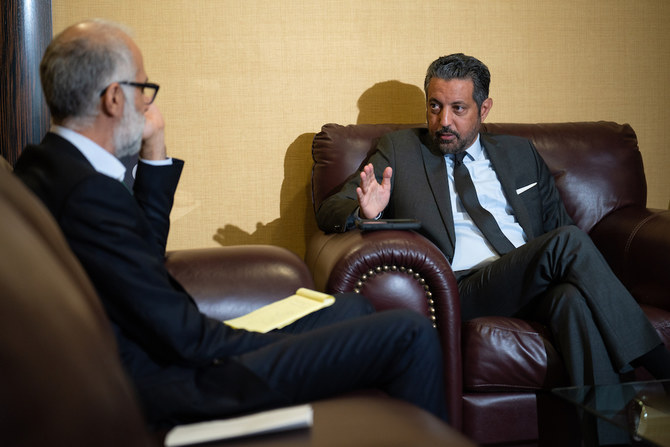
- In an exclusive interview with Arab News, Taher Elsonni highlights the challenges facing Libya and how foreign powers are making them worse
- In addition to national reconciliation there is a need for international reconciliation between the international community and Libyans, he said.
Israeli official says Hamas demand for end to war ‘thwarting’ truce efforts
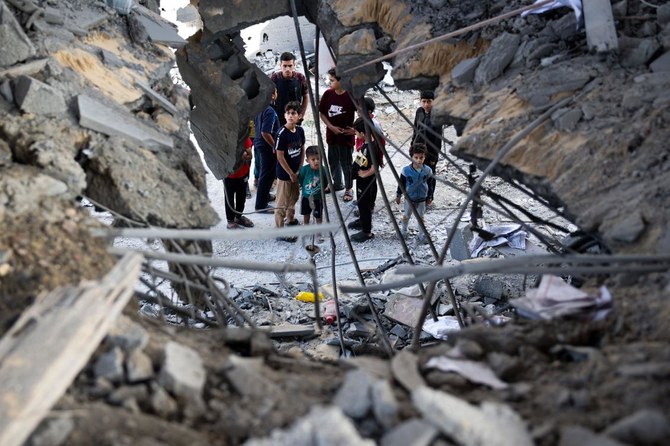
The official said suggestions Israel was prepared to allow mediators to provide Hamas with guarantees of an end to the war were also “not accurate“
JERUSALEM: A top Israeli official said Saturday that Hamas’s continued demand for a lasting ceasefire in the war in Gaza was stymying prospects of reaching a truce.
“So far, Hamas has not given up its demand to end the war, thus thwarting the possibility of reaching an agreement,” the official told AFP on condition of anonymity.
The official rejected reports that Israel had agreed to end the war as part of a deal to free the hostages held by Gaza militants.
The official said suggestions Israel was prepared to allow mediators to provide Hamas with guarantees of an end to the war were also “not accurate.”
The official’s comments came after Hamas negotiators returned to Egypt on Saturday to give their response to a proposed pause in the nearly seven-month war.
Mediators from Egypt, Qatar and the United States have been waiting for Hamas to respond to a proposal that would halt fighting for 40 days and exchange hostages for Palestinian prisoners in Israeli jails, according to details released by Britain.
Despite months of shuttle diplomacy between the warring parties, the mediators have been unable to broker a new truce like the week-long ceasefire that saw 105 hostages released last November, the Israelis among them in exchange for Palestinians held by Israel.
Thousands of Israelis rallied in Tel Aviv late Saturday demanding a deal to free the remaining hostages. They waved Israeli flags and placards calling on the government to “Bring them Home!“
Israel says 128 hostages remain in Gaza. The army says 35 of them are presumed dead.
On Saturday, shortly before 9 p.m. (1800 GMT), a senior Hamas source close to the negotiations in Cairo told AFP there had been “no developments” and the day’s talks “have ended.”
“Tomorrow, a new round will begin,” the source said.
Earlier, the Israeli official had said Israel would not send a negotiating team to Cairo until it saw “positive movement” on the framework for a hostage deal.
“What we are looking at is an agreement over a framework for a possible hostage deal,” the official said.
“Tough and long negotiations are expected for an actual deal.”
Hamas has said the main stumbling block is Israeli Prime Minister Benjamin Netanyahu’s insistence on sending ground troops into Rafah, the south Gaza city that is packed with displaced civilians.
Washington has said repeatedly that it opposes any military operation in Rafah that endangers the 1.2 million civilians sheltering there.
Relative calm in southern Lebanon amid talks on French peace plan and Israeli-US coordination
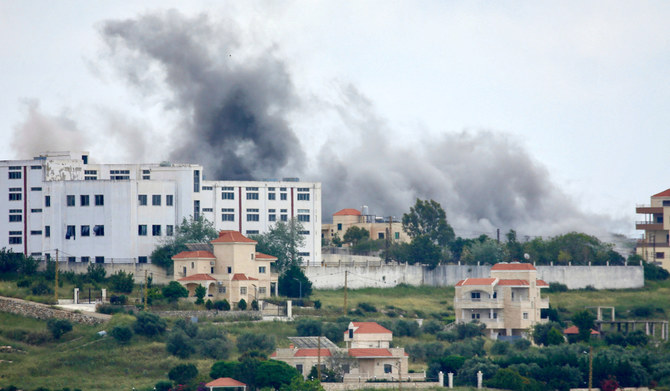
- Lebanese officials receive amended proposal that summarizes meetings held by Stephane Sejourne, France’s foreign minister, in Lebanon and Israel
- On Friday and Saturday there was a noticeable decline, generally, in hostilities between the two sides in southern Lebanon, though there were exceptions
BEIRUT: Discussions continued on Saturday about a French proposal designed to ease tensions and halt clashes between the Israeli army and Hezbollah along Lebanon’s southern border.
Lebanese officials received an amended version of the proposal on Friday, which summarized meetings held by Stephane Sejourne, France’s foreign minister, in Lebanon and Israel.
The proposal also aims to ensure the full implementation of UN Security Council Resolution 1701, which was adopted in 2006 with the aim of resolving the war that year between Israel and Hezbollah.
One political observer said Lebanese officials had prepared a response to the French document and were awaiting Israel’s response.
On Friday and Saturday there was a noticeable decline, generally, in hostilities between the two sides in southern Lebanon, though there were exceptions. One of them was the targeting of the “Israeli Meron Airbase in the Safed area on Friday from Lebanese territories,” Israeli authorities said. Hezbollah did not immediately claim responsibility for the attack. However, the group did say it shelled the Israeli site of Bayad Blida at dawn on Saturday while Israeli soldiers were there.
Meanwhile, the Israeli army opened fire in the vicinity of a shepherd in Wazzani but he was unharmed. Israeli artillery targeted Aita Al-Shaab, Jabal Blat and the outskirts of the towns of Naqoura and Alma Al-Shaab.
Extreme caution seemed to prevail in many border areas as Israeli reconnaissance warplanes continued to operate over Hasbaya and the occupied Shebaa Farms, reaching Western Bekaa and Iqlim Al-Tuffah.
In addition to the diplomatic processes related to the French peace plan, Lebanese authorities were also awaiting the outcome of negotiations in Cairo for a possible agreement between Israel and Hamas on a ceasefire in Gaza. Hezbollah previously linked any end to hostilities in southern Lebanon along the border with Israel to a ceasefire in the Gaza Strip.
Channel 12 news in Israel reported on Saturday that the security establishment in Tel Aviv believed Israeli authorities were close to an agreement with Hezbollah and Lebanon, similar to the provisions of UN Resolution 1701. It said the Israeli security establishment was working with US officials on the process, including American envoy Amos Hochstein, who oversaw indirect negotiations between Lebanon and Israel to demarcate their maritime borders in 2022.
Regarding the French peace plan, Nabih Berri, the speaker of the Lebanese Parliament, said he had received a copy of the document from the French Embassy in Lebanon and will respond.
“It included acceptable points and others that are unacceptable and must be amended, subject to discussion and review,” he added.
The revised proposal refers to a previous ceasefire agreement signed by Israel and Lebanon on April 26, 1996. It also highlights the steps that can be “taken to stop the escalation and ensure the effective implementation of UN Resolution 1701.”
Media leaks suggested its recommendations included “creating a monitoring group with the US, France, Lebanon and Israel. This group would oversee implementation and address any complaints from the involved parties in stages.”
The first stage would require Lebanese armed groups to halt their military operations inside Israel and disputed border regions, refrain from attacking personnel or facilities belonging to the UN Interim Force in Lebanon, and guarantee unrestricted freedom of movement for UNIFIL forces, including patrols in all areas south of the Litani River.
It calls on Israel to “halt military operations inside Lebanon, including airstrikes on Lebanese territory, refrain from any actions that may put UNIFIL personnel or facilities at risk, and ensure UNIFIL’s freedom of movement, including stopping the locking of aircraft radars on UNIFIL naval forces ships.”
Regarding UNIFIL’s mission in the first phase, the French initiative said the force will be “monitoring the cessation of hostilities on the ground and increasing the number of patrols and redeployments along the Blue Line to ensure effective respect for the cessation of hostilities and subsequent commitments by the parties.”
The Blue Line is a demarcation line dividing Lebanon from Israel that was set by the UN in June 2000 to determine whether Israeli forces had fully withdrawn from Lebanon.
The second phase of the French initiative, to be implemented within three days, would involve “dismantling all installations, facilities and centers near the Blue Line, including containers, small towers and tents, and the withdrawal of combat forces, including the Radwan militia, and military capabilities, including shooting capabilities in depth and anti-tank systems, for a distance of not less than 10 kilometers north of the Blue Line.”
It would also require Israel to “stop flying over Lebanese airspace.” It urges Lebanon to resume meetings of the tripartite mechanism, involving UNIFIL and the Israeli and Lebanese militaries, and deploy about 15,000 Lebanese soldiers along the Blue Line south of the Litani River, with UNIFIL and other international partners supporting this deployment.
During a 10-day third phase, Lebanon and Israel, with UNIFIL support, would be expected to resume talks about their land borders. These are intended build on negotiations that took place in 2017, and focus on areas already discussed in 2018 within the framework of the UNIFIL tripartite mechanism, with the aim of establishing an area between the Blue Line and the Litani River free of armed groups and weapons other than those related to the Lebanese government and UNIFIL.
These talks would take place in parallel with international efforts in the form of a support group to assist in the deployment of Lebanese forces in the southern region, and the social and economic development of the region.
Israeli forces kill five Palestinians in overnight raid near West Bank’s Tulkarm
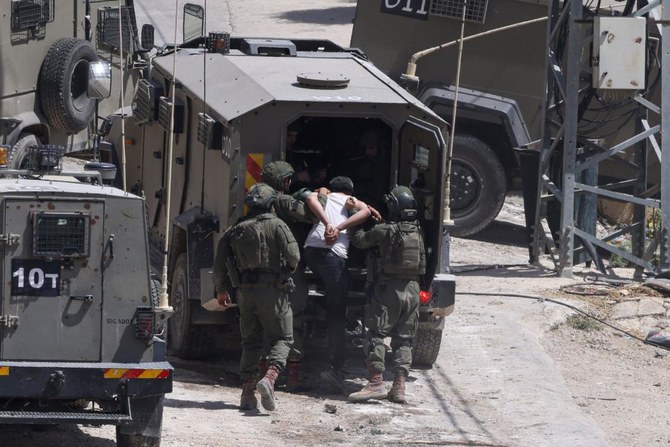
- The health ministry said it had identified four of the five who died during the raid in Deir Al-Ghusun
- The Israeli military said an officer from a special police unit was wounded in the operation and hospitalized
TULKARM, West Bank: Israeli forces killed five Palestinians in an overnight raid in a village near the city of Tulkarm in the occupied West Bank, the Palestinian health ministry and the Israeli military said on Saturday.
The health ministry said it had identified four of the five who died during the raid in Deir Al-Ghusun. Israeli forces took some of the dead bodies, according to the official Palestinian news agency Wafa and a Reuters reporter at the scene.
The Israeli military said an officer from a special police unit was wounded in the operation and hospitalized. It said its forces retaliated using live ammunition and shoulder-fired missiles after they were fired on.
Saturday’s operation near the flashpoint city of Tulkarm was the latest in a series of clashes in the occupied West Bank between Israeli forces and Palestinians that has been escalating for more than two years but which has picked up in intensity since the Hamas-led attack on Israel last October.
According to Palestinian Health Ministry records, 492 Palestinians have been killed by Israeli forces or Jewish settlers in the West Bank or East Jerusalem since Oct. 7. Many have been armed fighters but stone-throwing youths and uninvolved civilians have also been killed.
Palestinians want the West Bank and Gaza, which Israel captured in the 1967 Middle East war, as the core of an independent state with East Jerusalem as its capital.
US-backed talks to reach an agreement between Israel and the Palestinians have been stalled for the past decade but the Gaza war has raised pressure for a revival of efforts to reach a two-state solution.
More than 34,000 Palestinians have been killed in Israel’s seven-month-old assault on the Gaza Strip, say health officials in the Hamas-ruled enclave. The war began when Hamas militants attacked Israel on Oct. 7, killing 1,200 people and abducting 252 others, of whom 132 are believed to remain in captivity in Gaza, according to Israeli tallies.
Tunisian protesters demand eviction of migrant encampment
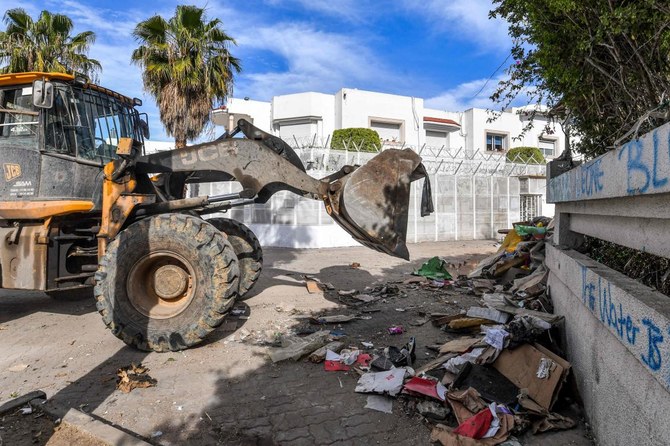
- The demonstration in the small town in central Tunisia follows recent crackdowns by authorities on similar encampments in the capital Tunis and other areas
- In El Amra, protesters called for the “departure” of migrants and the “quick” eviction of the thousands estimated to be staying there
EL AMRA, Tunisia: Hundreds of Tunisians rallied Saturday in the town of El Amra to protest makeshift camps for migrants primarily from sub-Saharan African countries, an AFP correspondent said.
The demonstration in the small town in central Tunisia follows recent crackdowns by authorities on similar encampments in the capital Tunis and other areas, often after complaints from local residents.
In El Amra, protesters called for the “departure” of migrants and the “quick” eviction of the thousands estimated to be staying there, the correspondent said.
Lawmaker Tarek Mahdi said that the “immediate solution” should be to get migrants to “leave urban areas and cities.”
The situation has become “unacceptable” and “the authorities must find a solution,” said Mahdi, who represents El Amra in parliament.
He added that other countries should help Tunisia to deal with a “very significant flow” of migrants.
The town is located about 40 kilometers (25 miles) north of Sfax, a key departure point for Europe-bound sea journeys from where migrants had been forcibly removed late last year.
Many migrants have fled to towns like El Amra, setting up encampments before they can make the perilous Mediterranean crossing, as Tunisian authorities and the European Union have ramped up efforts to curb irregular migration.
A surge of anti-migrant violence last year, following remarks by President Kais Saied who painted “illegal” foreigners as a demographic threat, has also pushed many out of main cities and into smaller towns.
Migrants attempting the sea crossing in search of a better life in Europe often aim to reach Italy, whose Lampedusa island lies some 150 kilometers away from Sfax, Tunisia’s second city.
In recent weeks, authorities raided several encampments, tearing down tents and expelling migrants.
The non-governmental Tunisian Forum for Social and Economic Rights said that authorities in Tunis on Friday cleared encampments and expelled hundreds of asylum seekers, migrants and refugees, sending them in buses to a western area near the Algerian border.
In a statement, the interior ministry said “security measures” had been taken to “deal with attacks on public and private property.”
Last month, Italian Prime Minister Giorgia Meloni visited Tunisia for a fourth time in less than a year to sign deals aiming to curb migration.
A day before her visit, Saied said that Tunisia must not become “a country of transit or settlement” for the tens of thousands of migrants attempting to cross the Mediterranean to Europe every year.
‘Substantial progress’ in Cairo talks on Gaza truce
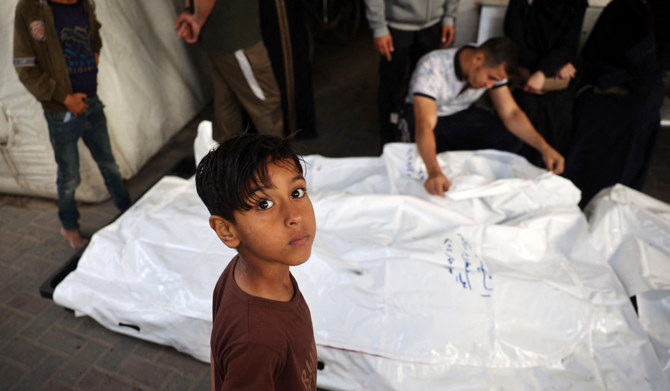
- The second phase will last at least six weeks, with both sides agreeing to release a larger number of hostages and prisoners, and also committing to a longer halt to the fighting
CAIRO: Talks in Cairo involving a Hamas delegation and Egyptian mediators have made substantial progress toward achieving a ceasefire in Gaza, according to a high-ranking source.
The source, who preferred not to be named, told Cairo News Channel that Hamas representatives and an Egyptian security delegation have reached consensus on many contentious points.
Hours before the Hamas delegation’s arrival in Cairo on Saturday, Gen. Abbas Kamel, chief of Egypt’s General Intelligence Directorate, received a phone call from the movement’s leader, Ismail Haniyeh, concerning the negotiations.
Security and political expert Ahmed Mustafa told Arab News: “According to my information, Hamas has agreed to the first phase of the ceasefire deal in Gaza.
“This includes the release of a number of hostages, with the assurance that Israel will fully withdraw from Gaza after 124 days, upon completion of the three stages of the major agreement being coordinated here in Cairo.”
Mustafa also said the Hamas delegation in Cairo is expected to inform the Egyptian side of its agreement with only minor amendments.
“I believe that Hamas has agreed on some terms with the Egyptian mediators now, and previously with the Qatari mediators under American guarantees,” he said.
However, Mustafa said that Israel’s refusal to end the war in Gaza as part of any hostage deal and its determination to eliminate what remains of Hamas remain “major points of contention.”
According to Mustafa, another point of disagreement concerns allowing the entry of dual-use materials into the enclave, for example humanitarian supplies that could also be used for combat purposes, such as fuel.
He said that the first phase, which Hamas “has tentatively agreed upon, will last up to 40 days, during which up to 33 of more than 100 Israeli hostages held in Gaza since Oct. 7 will be released.”
The second phase will last at least six weeks, with both sides agreeing to release a larger number of hostages and prisoners, and also committing to a longer halt to the fighting.
Aboud Jamal, a researcher on Palestinian affairs, told Arab News: “Hamas announced on Friday evening that settlements had been reached, and a delegation from the movement would head to Cairo on Saturday to secure an agreement in a way that meets the demands of the Palestinians.”
Jamal added: “It is clear that the coming days will witness an agreement to cease fire along with the release of some Israeli hostages.
“The only remaining issue is the stance of the Israeli government, which seems to want to prolong the war to maintain (Benjamin) Netanyahu’s government following the recent protests against him in Israel.”
Jamal said the Israeli government stands to benefit by obstructing any agreement.
“So, by sending its delegation to Cairo and discussing its agreement to terms in the prospective deal through mediators, Hamas has preempted the Tel Aviv government, a move for which the movement’s leaders are to be commended.”
He added: “It appears that Egypt truly stands with the Palestinian people and is supportive of reaching an agreement that ensures a ceasefire to save what can be saved of the lives of Gaza’s residents.
“This was evident from the statement issued by Hamas before its security delegation headed to Cairo, stating that Hamas leader Ismail Haniyeh appreciates the role that Egypt is playing.”


